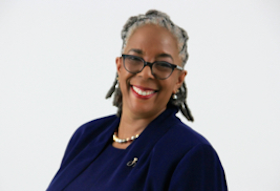
Tamara Smiley Hamilton
By Tamara Smiley Hamilton
When I began the out-of-body experience of returning to “school” in January 2017 to study conflict and race at the School for Conflict Analysis and Resolution, I had no idea of the wonderment of this decision. At 65, I was filled with the fear of the unknown: what would it be like to be in class with my grandchildren? Would I remember how to read academically? Could I still write a research paper? What if I am just too slow? My apprehension was brought on by something I read which said that in our senior years our brain cells are not what they used to be.
I remember the first day of the Conflict 600 class and hearing students talk about the reading assignment. I had arrived early for a seat in the front—the old-school way. I had a new spiral notebook and colored pens while most had laptops and iPads. To my utter dismay, they were already talking about assignments.
“Excuse me.” I summoned the courage to intervene in lightning fast conversation.
“Uh…you already have the syllabus?” Gulp.
“There was an assignment already??” I must have sounded incredulously out of touch. That is when I realized Blackboard had to become my best friend. Everyone had logged in, downloaded the syllabus, prepared the first assignment, and were ready to go. I sat in silence as the discussion swirled around me. The invisible dunce cap was a perfect fit.
One student, all of twenty-four years old, sensed my dread and whispered: “Don’t worry. I will help you with Blackboard.” She emailed me articles that escaped me no matter how I searched.
When I missed a class, another shared her notes. For a final group project, my partner was twenty-one and had graduated from my children’s high school, but our teamwork was genuine and the result pleased the professor.
The happy report after a few short weeks: The “kids” were amazing! My white hair was an instant magnet. One day I was late, a classmate approached me after class and said: “We get nervous when you are late. You drop such pearls of wisdom every time you speak.” I just melted. All of my fear and angst floated away—even my fear of Blackboard!
As the weeks rolled by, I adapted to the pace of learning. I always felt behind in the reading until I relearned how to read research articles again after forty years. My questions got better and the angst subsided. I went from drowning to floating to swimming through the material by the last week of classes.
The professors treated me like living history. Rich Rubenstein, who wrote books on urban unrest, saw me as a valuable oral historian as I described the nights I watched Watts burn from my back porch. Many times, he would say: “You guys won’t remember this because you weren’t born, but Tamara does!” We would then go into an enchanting dialogue about James Baldwin, the Black Panthers in Los Angeles, and the gentrification occurring in Watts and Crenshaw. The class sat in wide-eyed wonder.
Tehema Lopez Bunyasi, another faculty member, gave me the honorable title of “The Forrest Gump of the Class.” I wear it proudly as someone who has lived a full and adventurous life: teaching poetry in a minimum men’s prison, living in a German village for seven years (no military), traveling with female ex-gang members as they taught courses in non-traditional careers for displaced and battered women, to teaching public speaking skills for the Obama White House.
The icing on the cake: I was humbled me when my name was called to receive the James H. Laue Scholarship Endowment. Dr. Laue was a founder of the field of conflict analysis and resolution and is remembered as one of the people who stood on the balcony with Dr. King that awful day in April 1968. The recognition fueled my passion to contribute to the field of conflict analysis and resolution.
This whole experience remains magical. I am not wondering what I will do when I “grow up” and graduate. I am basking in the joy of learning and being without the pressure of what’s next?
As the new school year approaches, I look forward to empowering experiences with Blackboard.
